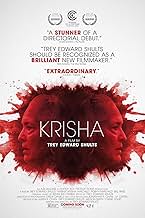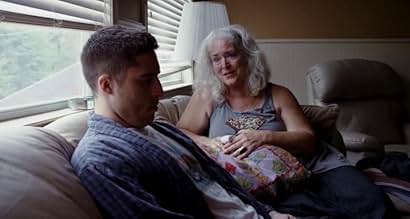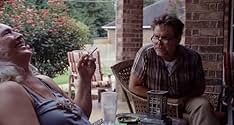NOTE IMDb
7,1/10
11 k
MA NOTE
Ajouter une intrigue dans votre langueKrisha returns for Thanksgiving dinner after ten years away from her family, but past demons threaten to ruin the festivities.Krisha returns for Thanksgiving dinner after ten years away from her family, but past demons threaten to ruin the festivities.Krisha returns for Thanksgiving dinner after ten years away from her family, but past demons threaten to ruin the festivities.
- Réalisation
- Scénario
- Casting principal
- Récompenses
- 17 victoires et 28 nominations au total
Avis à la une
For reasons never made entirely evident, 60-something Krisha has willfully severed ties for several years with her family, including a now young adult son. She decides to reconnect with her kin for Thanksgiving dinner at the suburban home of her sister and her family.
I grew up in a suburban Texas community not unlike the one which serves as the setting for the entirety of "Krisha". As such, I can almost literally sense the air, smell the scents and feel the sensibility of the space these characters inhabit. I have lived it. The memories for me are lasting. And they are abundantly good. Not so in this mostly morose and melancholy scenario.
Veteran but still little-known actress Krisha Fairchild ("The Killing of John Lennon" representing one of a handful of somewhat recognizable credits) delivers remarkable and wrenching work here. Fairchild is exceptionally effecting as she gives us a deeply troubled profile of an irrevocably tortured soul riddled with substance abuse, self loathing, uncontrollable anger and crippling regret.
This is a mysterious woman to be sure. Where exactly has Krisha been for all of these years in estrangement? What is it that has occupied her life during this time of indistinct purpose? Krisha reveals only vague hints and innuendo to various members of an uncomfortably skeptical family. Observing the holiday festivities and camaraderie carry on all about her, she remains remote, detached, never engaging in any of it, focusing instead almost exclusively and at her own insistence on preparing the super-sized turkey for that evening's meal.
The very characteristics that make Fairchild's portrayal so riveting are the same traits that make this excruciatingly conflicted character so dreadfully off-putting. Because we do not come to know practically anything at all about why Krisha ever abandoned her family in the first place, we never have a frame of reference for why she would ever even choose to do this. This confounding ambiguity leaves us feeling as distant from Krisha as she is from her own flesh and blood relatives. How can we genuinely invest in and grow to care for a person about whom we know virtually nothing and who has given us no compelling reason to do so? We feel very sorry for Krisha, sure. But beyond that we are inspired to generate little if any emotion beyond pure pity.
Technically, much of the key speech in "Krisha" was extremely difficult to make out, either as a result of it being overly hushed or garbled as characters talked over and above each other. I by and large appreciate natural dialogue as it is spoken in "real life" in most films, a dynamic that first time feature Writer and Director Trey Edward Shults was clearly striving for in his project. But when it is impossible to decipher what is being said, even after rewinding and replaying these scenes as I was able to do, the overall effect which you are efforting to achieve is unfortunately, and frustratingly, lost in translation. Moments involving Krisha and her wheelchair-bound mentally fragile mother, and what should have been a memorably moving interchange between Krisha and her long-suffering sister toward the end of the picture, are two especially conspicuous examples of these audio recording shortcomings really hurting the overall impact of the story.
Shults's choice to employ a constant instrumental undercurrent of enormously edgy electronica for the first several minutes of "Krisha" certainly serves it's purpose of establishing an atmosphere of palpably building tension. But soon the moody music devolves into an overdone distraction, eventually becoming simply an ill-advised artistic affectation.
This is criticism reasonably forgivable for a rookie from a personal perspective. But ideally they are lasting lessons learned in what, even with these missteps, looks to be a considerably capable career.
This is a depressing movie. Unrelentingly so. And I know from depressing flicks, having seen my share of them over the years. However, there aren't many among this gloomy group that I would rank above "Krisha".
In the end, nothing is clarified and nothing is resolved in "Krisha". Consequently, as an audience we are left with no appreciable degree of either resonance nor redemption. Only a sad and sour familial holiday experience. And, though granted generally not this extent, haven't we all in our own lives had our fill of at least some manner of domestic dysfunction? Watching somebody else's tumult and torture and classifying it as worse than one's own is not exactly a superlative barometer for satisfying cinematic consumption.
I'm giving "Krisha" a charitable 6 out of 10, almost entirely, and quite candidly, because the film was shot in The Lone Star State and out of high regard for Fairchild's arresting performance.
I grew up in a suburban Texas community not unlike the one which serves as the setting for the entirety of "Krisha". As such, I can almost literally sense the air, smell the scents and feel the sensibility of the space these characters inhabit. I have lived it. The memories for me are lasting. And they are abundantly good. Not so in this mostly morose and melancholy scenario.
Veteran but still little-known actress Krisha Fairchild ("The Killing of John Lennon" representing one of a handful of somewhat recognizable credits) delivers remarkable and wrenching work here. Fairchild is exceptionally effecting as she gives us a deeply troubled profile of an irrevocably tortured soul riddled with substance abuse, self loathing, uncontrollable anger and crippling regret.
This is a mysterious woman to be sure. Where exactly has Krisha been for all of these years in estrangement? What is it that has occupied her life during this time of indistinct purpose? Krisha reveals only vague hints and innuendo to various members of an uncomfortably skeptical family. Observing the holiday festivities and camaraderie carry on all about her, she remains remote, detached, never engaging in any of it, focusing instead almost exclusively and at her own insistence on preparing the super-sized turkey for that evening's meal.
The very characteristics that make Fairchild's portrayal so riveting are the same traits that make this excruciatingly conflicted character so dreadfully off-putting. Because we do not come to know practically anything at all about why Krisha ever abandoned her family in the first place, we never have a frame of reference for why she would ever even choose to do this. This confounding ambiguity leaves us feeling as distant from Krisha as she is from her own flesh and blood relatives. How can we genuinely invest in and grow to care for a person about whom we know virtually nothing and who has given us no compelling reason to do so? We feel very sorry for Krisha, sure. But beyond that we are inspired to generate little if any emotion beyond pure pity.
Technically, much of the key speech in "Krisha" was extremely difficult to make out, either as a result of it being overly hushed or garbled as characters talked over and above each other. I by and large appreciate natural dialogue as it is spoken in "real life" in most films, a dynamic that first time feature Writer and Director Trey Edward Shults was clearly striving for in his project. But when it is impossible to decipher what is being said, even after rewinding and replaying these scenes as I was able to do, the overall effect which you are efforting to achieve is unfortunately, and frustratingly, lost in translation. Moments involving Krisha and her wheelchair-bound mentally fragile mother, and what should have been a memorably moving interchange between Krisha and her long-suffering sister toward the end of the picture, are two especially conspicuous examples of these audio recording shortcomings really hurting the overall impact of the story.
Shults's choice to employ a constant instrumental undercurrent of enormously edgy electronica for the first several minutes of "Krisha" certainly serves it's purpose of establishing an atmosphere of palpably building tension. But soon the moody music devolves into an overdone distraction, eventually becoming simply an ill-advised artistic affectation.
This is criticism reasonably forgivable for a rookie from a personal perspective. But ideally they are lasting lessons learned in what, even with these missteps, looks to be a considerably capable career.
This is a depressing movie. Unrelentingly so. And I know from depressing flicks, having seen my share of them over the years. However, there aren't many among this gloomy group that I would rank above "Krisha".
In the end, nothing is clarified and nothing is resolved in "Krisha". Consequently, as an audience we are left with no appreciable degree of either resonance nor redemption. Only a sad and sour familial holiday experience. And, though granted generally not this extent, haven't we all in our own lives had our fill of at least some manner of domestic dysfunction? Watching somebody else's tumult and torture and classifying it as worse than one's own is not exactly a superlative barometer for satisfying cinematic consumption.
I'm giving "Krisha" a charitable 6 out of 10, almost entirely, and quite candidly, because the film was shot in The Lone Star State and out of high regard for Fairchild's arresting performance.
Greetings again from the darkness. If we need a poster child for independent film, perhaps this little gem from writer/director Trey Edward Shults should be the leading candidate. The film is daring and raw and proves that even a familiar theme can be interesting if the creative forces are allowed to do what they do best. And on top of that
it was filmed in 9 days with no "stars" and almost no money.
The extended opening shot is a close up of only a woman's face. Her eyes are expressive and her lip begins to quiver. Her look could be described as unnerved, and with the ominous music playing, our mind leads us to believe we are headed towards a horror film. Oh, how right and wrong that initial impression proves to be.
That woman is Krisha (played by Krisha Fairchild), a sixty-something year old who is joining her family for Thanksgiving dinner – after a 10 year absence. Of course, there are no shortage of family holiday dinner disaster movies, but most of the time they are either slapstick comedy or so stagey that the frustration never strikes a chord. Not so with this one.
Tension is palpable in every scene. It's as if everyone is waiting for the proverbial shoe to drop. Krisha is a trainwreck as a mother, sister and person. She is an alcoholic and drug addict, though she proclaims herself healed. It's pretty obvious to everyone (except herself) that her best intentions are not firmly planted in reality and the inevitable is only a matter of time. Old wounds are re-opened (though they were probably never closed), and a simple conversation on the patio or checking the timer for the baking turkey become near catastrophes.
Mr. Shults has economically and effectively cast many of his own family members, and filmed in his mother's home outside of Houston. Krisha is his real life Aunt, and Robyn (who plays Krisha's emotionally devastated sister) is the director's mother. This is a story that works because of the realness of each moment. It feels like family members unloading on each other rather than two actors reciting lines. Krisha's swig of wine in the bathroom provides a moment of relief for both her and the viewer. Having been called "heartbreak incarnate" and an "abandoneer" we even sympathize with her instinct to retreat to the bottle, though it's with dread and misery.
Director Shults displays promise as a director who can capture a personal moment, no matter how awkward or painful. Krisha Fairchild has a Gena Rowlands on screen presence (very high praise) that delivers a touch of grounded realism to her words and actions. As a lover of independent films, here's hoping we see more from them both in the very near future.
The extended opening shot is a close up of only a woman's face. Her eyes are expressive and her lip begins to quiver. Her look could be described as unnerved, and with the ominous music playing, our mind leads us to believe we are headed towards a horror film. Oh, how right and wrong that initial impression proves to be.
That woman is Krisha (played by Krisha Fairchild), a sixty-something year old who is joining her family for Thanksgiving dinner – after a 10 year absence. Of course, there are no shortage of family holiday dinner disaster movies, but most of the time they are either slapstick comedy or so stagey that the frustration never strikes a chord. Not so with this one.
Tension is palpable in every scene. It's as if everyone is waiting for the proverbial shoe to drop. Krisha is a trainwreck as a mother, sister and person. She is an alcoholic and drug addict, though she proclaims herself healed. It's pretty obvious to everyone (except herself) that her best intentions are not firmly planted in reality and the inevitable is only a matter of time. Old wounds are re-opened (though they were probably never closed), and a simple conversation on the patio or checking the timer for the baking turkey become near catastrophes.
Mr. Shults has economically and effectively cast many of his own family members, and filmed in his mother's home outside of Houston. Krisha is his real life Aunt, and Robyn (who plays Krisha's emotionally devastated sister) is the director's mother. This is a story that works because of the realness of each moment. It feels like family members unloading on each other rather than two actors reciting lines. Krisha's swig of wine in the bathroom provides a moment of relief for both her and the viewer. Having been called "heartbreak incarnate" and an "abandoneer" we even sympathize with her instinct to retreat to the bottle, though it's with dread and misery.
Director Shults displays promise as a director who can capture a personal moment, no matter how awkward or painful. Krisha Fairchild has a Gena Rowlands on screen presence (very high praise) that delivers a touch of grounded realism to her words and actions. As a lover of independent films, here's hoping we see more from them both in the very near future.
I don't know where that "comedy" label on IMDb comes from. I don't think it functions even as a black comedy. Absolutely heavy and quite dark, but fabulously written, directed, and acted. There are many films that deal with this sort of premise (even Rachel Getting Married comes to mind) but this really took it to another level. Completely immersive, watching it all unravel just hurts to watch. Not an easy viewing by any means and definitely one that will divide audiences completely (even on this board, I can see many people hating it). I loved it though, easily one of the best of the year so far. Krisha Fairchild should absolutely be in contention for end-of-the- year awards, and Trey Edward Shults shows a lot of talent.
The unpleasant dynamics and tensions that many families navigate during the holidays can sometimes be downright horrifying. "Krisha," the story of a woman reunited with her family after she estranged herself many years ago in order to face her demons, is a stark reminder of how traumatic confronting the past can be.
Starring his aunt (Krisha Fairchild) and featuring himself and many of his family members, filmmaker Trey Edward Shults has gone extremely personal for his debut feature (based off a short of the same name). The film has a documentary-like feel at times and the family dynamics that play out on screen seem unusually authentic and genuine. Yet underneath it all, Shults works with camera technique and a non-traditional score to remind us how unsettling and difficult this is for his title character.
"Krisha," the film and the character, slowly becomes unhinged over the course of the film. Shults' script smartly denies us the amount of background information we'd like to have; we don't need to know exactly what she's done or what her problems were to be able to observe how frazzled this environment makes her and how confronting these long- ignored but deep-rooted relationships could dismantle her mentally and emotionally.
Shults begins and ends his film with close-ups of Krisha's face giving an indiscernible expression, perhaps with the goal of empathy. Normally we would empathize with the "normal" family members and in many ways we still do, but Shults stays close to Krisha in nearly every moment of the film and gives us piercing access to who she is. Fairchild rises up to meet the challenges that level of intimacy places on an actor. We see Krisha's discomfort and pain, and the sadness when her desire to make things right hits the roadblock of the pain she caused others in the past.
When tension does turn over to drama, the way it plays out feels impressively true to life. Shults clearly plays loose with his script, allowing these unseasoned actors to draw on their own experiences (and perhaps some actual family dynamics) and improvise dialogue. Even if you haven't had a family member melt down in front of everyone, there's a raw truth to the way tense scenes between people play out. That authenticity only makes "Krisha" all the more haunting.
Shults' direction and editing, however, is really the star of this film. He has strong instincts in terms of suspense, creating that slow build and unhinging of his film in the most simple of ways. Even in the most mundane of scenes, he draws forward any tension lurking beneath the surface. He also allows us to see, hear and experience things as the overmedicated mind of Krisha does, yet the techniques are not heavy-handed. He even plays with the chronology of events, weaving together scenes to focus on the emotional arc of the story as it pertains to Krisha rather than feeling beholden to how everything builds up in real time. The result is a much stronger portrait of Krisha and what's truly happening at a deeper level.
Filmmakers that can wield tension and suspense in this way have the skills to tell just about any story well, which bodes well for Shults' career. If he can turn the story of a troubled woman relapsing at Thanksgiving into what you might argue is a horror film that at times verges on Darren Aronofsky's "Requiem for a Dream," the sky's the limit.
~Steven C
Thanks for reading! Visit Movie Muse Reviews for more
Starring his aunt (Krisha Fairchild) and featuring himself and many of his family members, filmmaker Trey Edward Shults has gone extremely personal for his debut feature (based off a short of the same name). The film has a documentary-like feel at times and the family dynamics that play out on screen seem unusually authentic and genuine. Yet underneath it all, Shults works with camera technique and a non-traditional score to remind us how unsettling and difficult this is for his title character.
"Krisha," the film and the character, slowly becomes unhinged over the course of the film. Shults' script smartly denies us the amount of background information we'd like to have; we don't need to know exactly what she's done or what her problems were to be able to observe how frazzled this environment makes her and how confronting these long- ignored but deep-rooted relationships could dismantle her mentally and emotionally.
Shults begins and ends his film with close-ups of Krisha's face giving an indiscernible expression, perhaps with the goal of empathy. Normally we would empathize with the "normal" family members and in many ways we still do, but Shults stays close to Krisha in nearly every moment of the film and gives us piercing access to who she is. Fairchild rises up to meet the challenges that level of intimacy places on an actor. We see Krisha's discomfort and pain, and the sadness when her desire to make things right hits the roadblock of the pain she caused others in the past.
When tension does turn over to drama, the way it plays out feels impressively true to life. Shults clearly plays loose with his script, allowing these unseasoned actors to draw on their own experiences (and perhaps some actual family dynamics) and improvise dialogue. Even if you haven't had a family member melt down in front of everyone, there's a raw truth to the way tense scenes between people play out. That authenticity only makes "Krisha" all the more haunting.
Shults' direction and editing, however, is really the star of this film. He has strong instincts in terms of suspense, creating that slow build and unhinging of his film in the most simple of ways. Even in the most mundane of scenes, he draws forward any tension lurking beneath the surface. He also allows us to see, hear and experience things as the overmedicated mind of Krisha does, yet the techniques are not heavy-handed. He even plays with the chronology of events, weaving together scenes to focus on the emotional arc of the story as it pertains to Krisha rather than feeling beholden to how everything builds up in real time. The result is a much stronger portrait of Krisha and what's truly happening at a deeper level.
Filmmakers that can wield tension and suspense in this way have the skills to tell just about any story well, which bodes well for Shults' career. If he can turn the story of a troubled woman relapsing at Thanksgiving into what you might argue is a horror film that at times verges on Darren Aronofsky's "Requiem for a Dream," the sky's the limit.
~Steven C
Thanks for reading! Visit Movie Muse Reviews for more
Like "La Cienaga", this movie has a veracity and intimacy that will freak out most self- appointed film critics (and I'm not one). If you can't handle domestic pain, tension, and heartbreak then don't watch it. As a big fan of Dostoyevsky I found it riveting and powerful. After viewing I immediately sought out the back story and wasn't surprised to learn the cast/family are actual family members. I don't think a filmmaker could achieve what Shults does with an all-actor cast. It matters not a whit to me that he used family members or that you can foresee an inevitable train wreck in the making toward the end of Act 2. A great film, and the audio effects are superb, especially in the kitchen scene and the use of a Nina Simone track to score Krisha's high flying cookoff.
Le saviez-vous
- AnecdotesBillie Fairchild, who plays Grandma in the film, is actually suffering from Alzheimer's Disease, so she was not entirely aware she was acting in a film, although director Trey Edward Shults said she had a wonderful time at the "Thanksgiving."
- ConnexionsFeatured in Human Nature: Creating It Comes at Night (2017)
- Bandes originalesJust in Time
Written by Betty Comden, Adolph Green, Jule Styne
Courtesy of Warner Chappell Inc o/b/o Stratford Music Corp.
Performed by Nina Simone
Courtesy of the Estate of Nina Simone and Rich & Famous Records, Ltd.
© 1968, courtesy of Steven Ames Brown
Meilleurs choix
Connectez-vous pour évaluer et suivre la liste de favoris afin de recevoir des recommandations personnalisées
- How long is Krisha?Alimenté par Alexa
Détails
Box-office
- Montant brut aux États-Unis et au Canada
- 144 822 $US
- Week-end de sortie aux États-Unis et au Canada
- 9 880 $US
- 20 mars 2016
- Montant brut mondial
- 144 822 $US
- Durée1 heure 23 minutes
- Couleur
- Mixage
- Rapport de forme
- 1.85 : 1
Contribuer à cette page
Suggérer une modification ou ajouter du contenu manquant

































